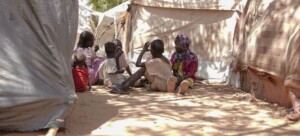West Kordofan: Suspected cholera spreads
The medical isolation centre of El Ahmar east of Abu Zabad has received seven new cases of acute watery diarrhoea suspected of cholera on Wednesday and Thursday.
 How to prevent the spread of cholera (Sudanese Doctors' Union)
How to prevent the spread of cholera (Sudanese Doctors' Union)
The medical isolation centre of El Ahmar east of Abu Zabad has received seven new cases of acute watery diarrhoea suspected of cholera on Wednesday and Thursday.
Activists reported that on Wednesday, the medical isolation centre received four new cases, while the same centre received three new cases, including a serious condition, which was transferred to El Banjadeed hospital near the village.
El Ahmar village of Abu Zabad locality in West Kordofan has recorded eight new cases of acute watery diarrhoea suspected to be cholera on Monday and Tuesday.
The total number of death because of the disease, according to activists has been five people; while there have been 21 cases of infection during the period from July 9 to Thursday, 26 July.
Suspected cholera
Sudan has experienced an epidemic since 2016 which the Sudanese government insists on calling ‘watery diarrhoea’ in spite of numerous independent confirmations (conducted according to WHO standards) that the disease which broke out in Blue Nile state in August 2016 was cholera, the Sudanese authorities and several international organisations persistently refer to it as ‘acute watery diarrhoea’.
The WHO and the Sudanese Ministry of Health reported in mid-October that the total number of recorded cases reached more than 35,000 people – including 800 related deaths. Doctors of Sudan’s National Epidemiological Corporation reported in early July however, that nearly 24,000 Sudanese had been infected and 940 cholera patients died.
In May, Sudan’s federal Minister of Health, Bahr Idris Abu Garda, declared that Sudan is now free of the 'watery diarrhoea' outbreak (suspected to be cholera) that hit various parts of the country during the past year.
*Cholera key facts (Source: WHO)
- Cholera is an acute diarrhoeal disease that can kill within hours if left untreated.
- Researchers have estimated that each year there are 1.3 million to 4.0 million cases of cholera, and 21 000 to 143 000 deaths worldwide due to cholera.
- Most of those infected will have no or mild symptoms, and can be successfully treated with oral rehydration solution.
- Severe cases will need rapid treatment with intravenous fluids and antibiotics.
- Provision of safe water and sanitation is critical to control the transmission of cholera and other waterborne diseases.
- Safe oral cholera vaccines should be used in conjunction with improvements in water and sanitation to control cholera outbreaks and for prevention in areas known to be high risk for cholera.
- A global strategy on cholera control with a target to reduce cholera deaths by 90 per cent was launched in 2017.
Follow #CholeraInSudan, #الكوليرا_السودان for ongoing coverage by Radio Dabanga











 and then
and then